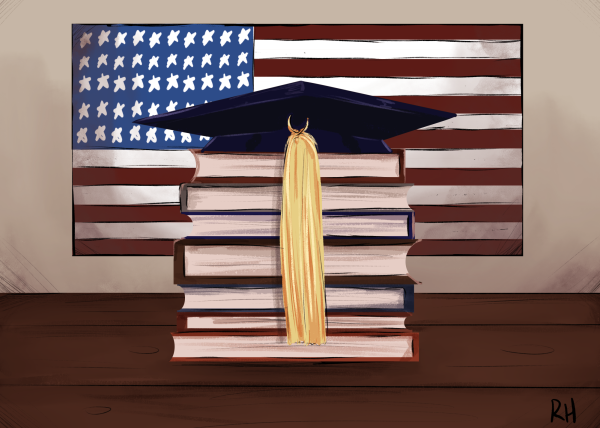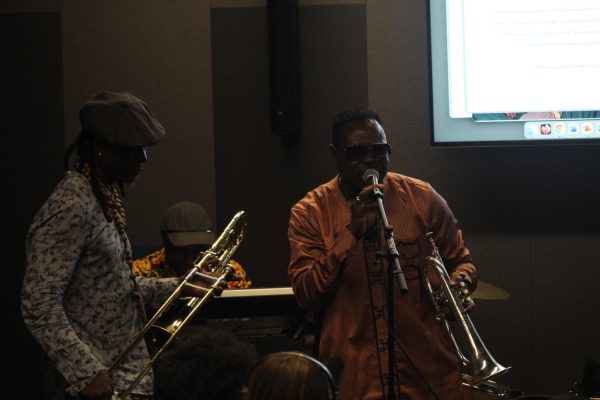Letters to the Editor
December 14, 1998
Breaking our own rules
Just minutes ago, I was on my way up the stairs in the 600 S. Michigan building to go to the Academic Computing Lab on the second floor…when who should I see but Columbia President John Duff. That would be no big deal to me on any other day of the week, but he was walking out of the stairwell with a cigar hanging out of his mouth! I couldn’t help but realize that on the door he walked out of, there was a sign from the Provost stating Columbia’s No Smoking rule. Shouldn’t the president of the college live up to the same rules and regulations that students, faculty, and staff must live up to?
Just a thought. Maybe he should have finished that awful-smelling thing in his office!
William Stevenson
Posted via Chronicle Forum
The Prez
I’m writing this letter in an attempt to expose the plethora of errors in the Dec. 7 editorial about President Clinton. Yes, criminals are not tried directly by public-opinion polls. However, they are tried by the public. What I mean is, laws are created by Congress, and Congress is elected by and subservient to the people.
So if, to use your rather outlandish example, at some point in time a majority of the public had espoused the opinion that a person should not be held accountable for robbing a gas station (or committing any other crime) because he was “really high on crack,” then that opinion would (or at least should) be drafted into a bill and passed into law.
And for those of you who think that something so ridiculous and contradictory to what most of us now perceive to be basic human rights (in this example, the right to not be robbed) would never happen, I would remind you of a little thing called slavery that we had in this country for a couple hundred years. My point is, congressmen and women don’t “go against” the opinion of the majority of their constituents (slavery was indeed supported by a majority of the inhabitants of slave states), and contrary to what you stated, they never should.
What do you think a democracy is? What was the point of the American Revolution? With regard to your statement that “many important decisions have been made when government (especially the Supreme Court) has gone against public opinion,” I would argue that such a feat is basically impossible, seeing as how the Supreme Court (and any other court) is bound by existing laws, which as I’ve said a couple times before, would not exist if they were not supported by a majority of the people in this country.
Lastly, in response to your question, “If Bill Clinton is the Commander in Chief and the military has a policy of discharging officers guilty of committing adultery, then doesn’t it stand to reason that Bill Clinton should be removed from his position?”
He is subject to the same laws as the rest of us average citizens, and if Ken Starr wants to try to prosecute Mr. Clinton for perjury in a criminal court of law, nobody’s going to stop him. But we’re talking about impeachment here, and at the core of that issue is: did the president commit perjury, and if he did, does that (or those) particular perjuries statement(s) amount to an impeachable offense?
First of all, it is not by any stretch of the imagination accepted as fact that the president has perjured himself (misled, yes; lied, maybe; perjured himself, almost certainly not). Secondly, even if it is decided that he did commit perjury, a phalanx of law professors and constitutional experts and historians that have appeared before the House Judiciary Committee in the past few weeks have said that perjury about sex should not be an impeachable offense.
The president should be censured, and if necessary tried in criminal court after his administration ends, but he should NOT be impeached.
Brian Allinson
Sophomore
Television Major
The President’s Club
As a Columbia alumnus, and heretofore a closet reader of The Chronicle, I am somewhat ashamed of the fact that I cannot wean myself from its routine shortsightedness. Case in point, Kelly M. Woyan’s article “President’s Club, Something For Nothing,” printed in the Dec. 7 edition.
Ms. Woyan’s article was not one at all. It was a foolishly cynical diatribe that skews the truth and misses the point. Columbia’s President Club is nothing more than a group of like-minded alumni and friends of the college, who believe in this school, its mission, and students like Ms. Woyan. These professionals raise thousands of dollars annually for scholarships.
My advice to Ms. Woyan is that to succeed in journalism, she must quickly learn two rules. First, no rational person expects a journalist to be devoid of opinion. However, one hopes that a reporter can at least learn how to be more subliminal in their value added writing. Second, please come to terms with the fact that nothing exists in a vacuum. Columbia College does not operate on tuition dollars alone. The Chronicle does not get published without advertisers. And Columbia journalism students do not find jobs without leads from their instructors.
Rather than using ink to debunk programs that work, why not use it to speak of the growth of Columbia, to the inventiveness of its students and to the high rapport that it enjoys because of opinion leaders and President’s Club members who promote its interests daily.
Ms. Woyan, Columbia’s success is your success. Lobbing cheap shots may satisfy a proverbial anger at the system, but in the real world, they go nowhere. In life, only those who produce solutions are ever asked to join the club.
Michael Wojcik
Class of ‘96
The U-Pass, naturally
I would like to point out a glaring flaw in Columbia’s argument against joining the U-Pass program. As I understand it, a concisive survey is planned to determine if at least 60 percent of the students at Columbia want the U-Pass. But, since when does a decision the school makes concerning the spending of funds have to benefit 60 percent of the students? Columbia should join the U-Pass program because it would benefit a large number of people — even if it falls short of 60 percent. The Residence Center doesn’t benefit 60 percent of the student body, neither does the new dance center. In fact, there is not a single department that contains 60 percent of Columbia’s students. And yet all of our money contributes to these things whether we use them or not. So I ask this question: Doesn’t it stand to reason that if the U-Pass is put to a vote, then all the school’s spending decisions should be voted on? Especially in light of the fact that a large part of our money seems to be going toward investing in Columbia’s future (through capital improvement and purchasing buildings) rather than benefitting the current students, it seems to me that Columbia would definitely not want this to happen.
Mark Dascoli
Film/Video Major







